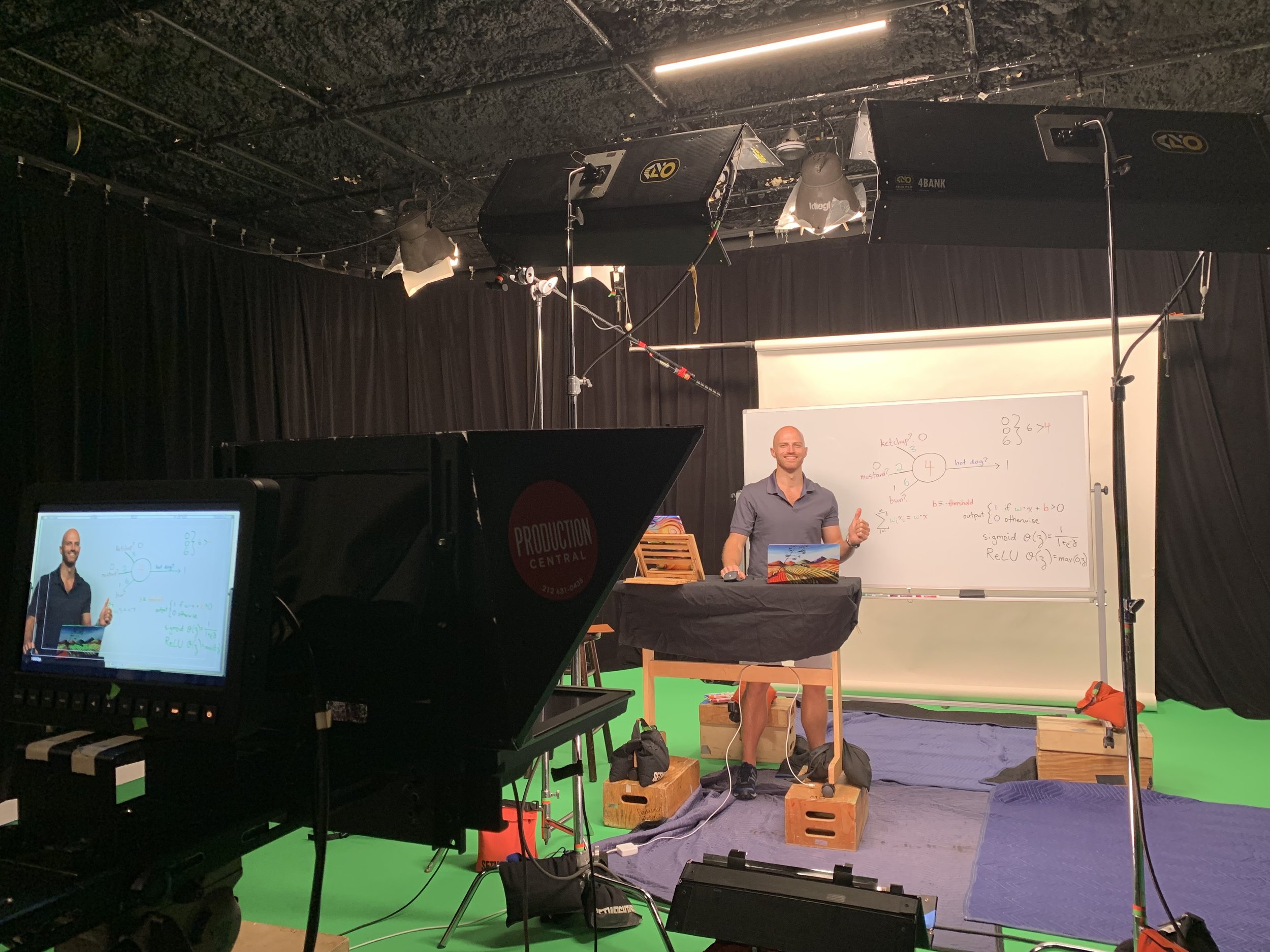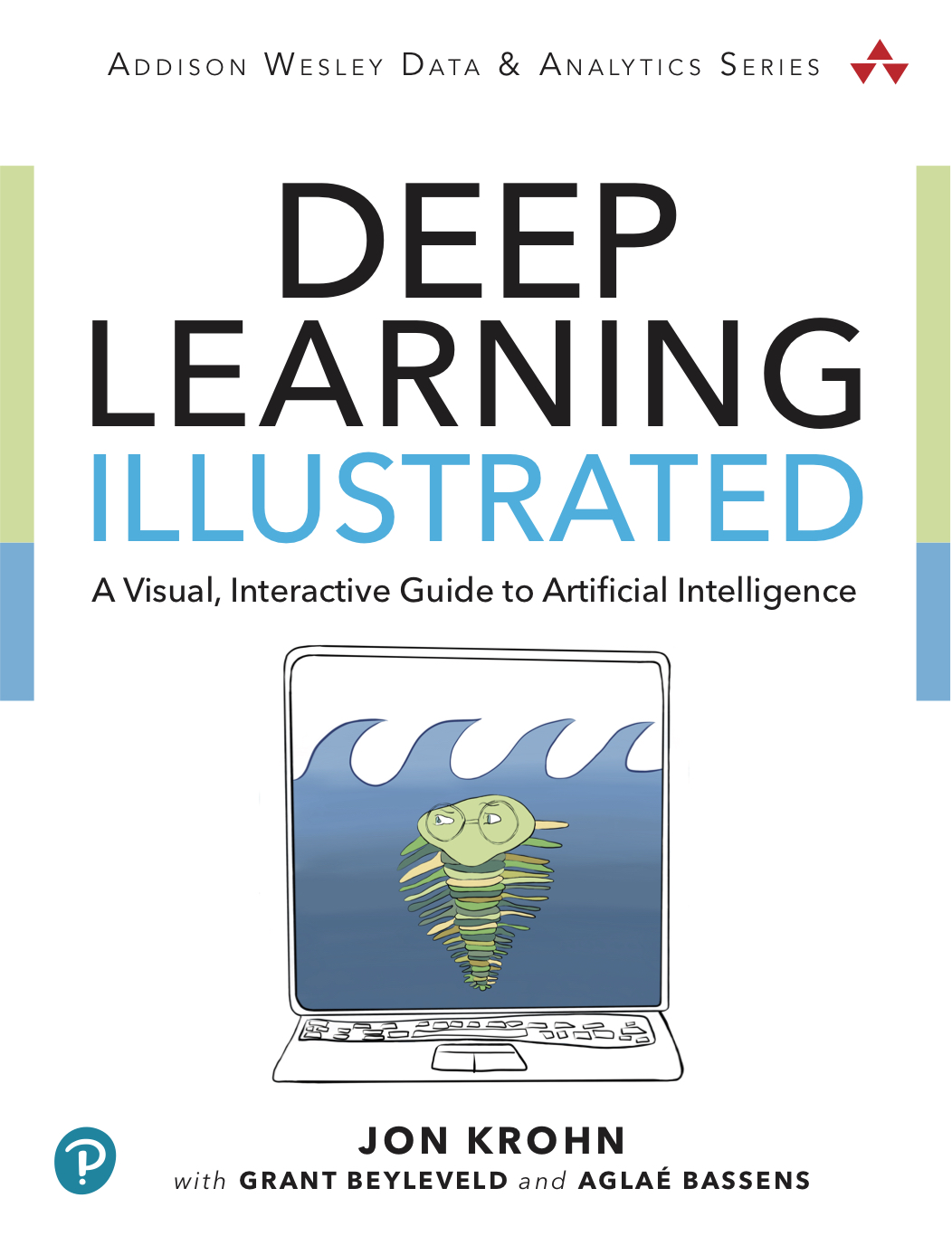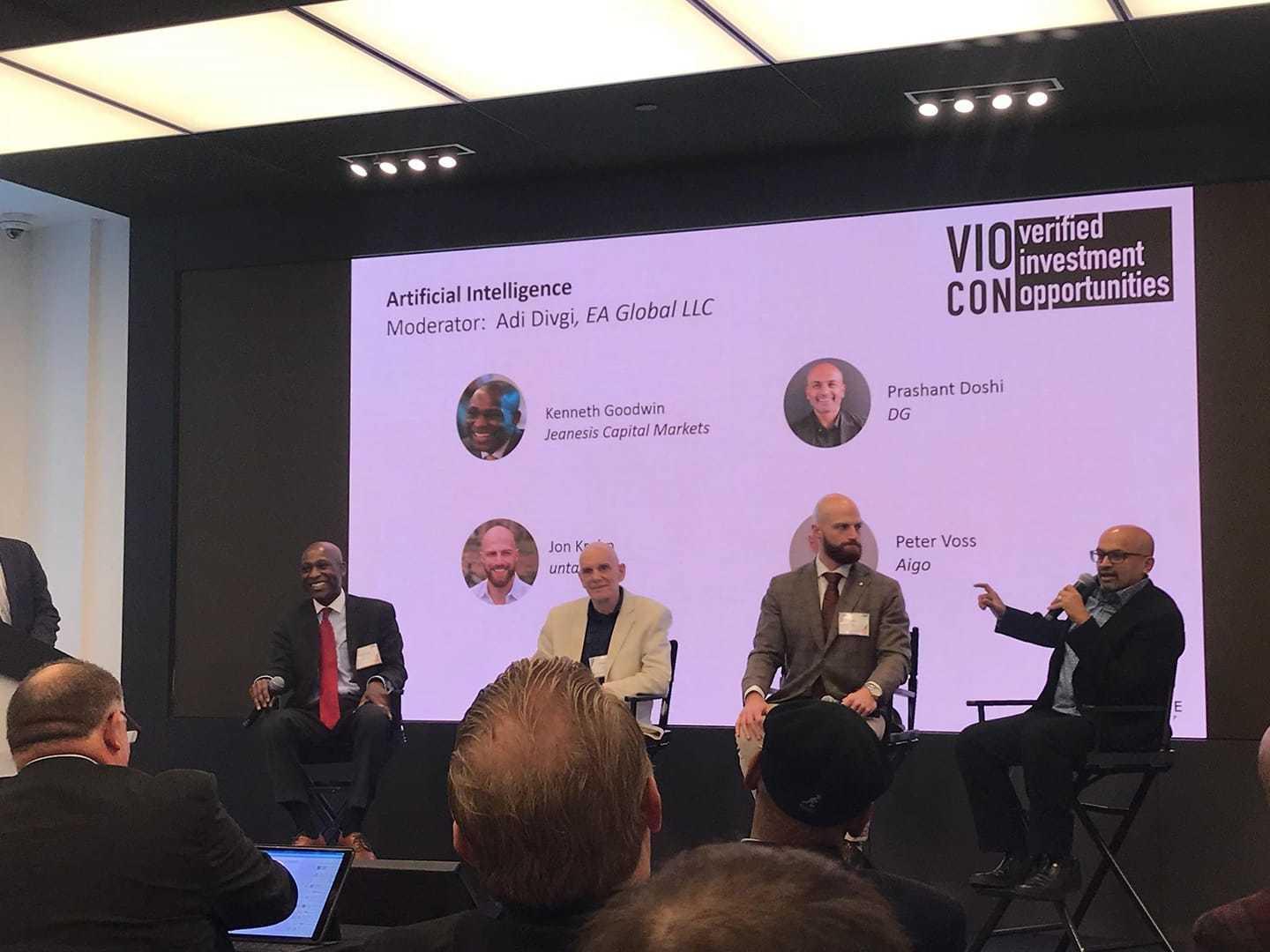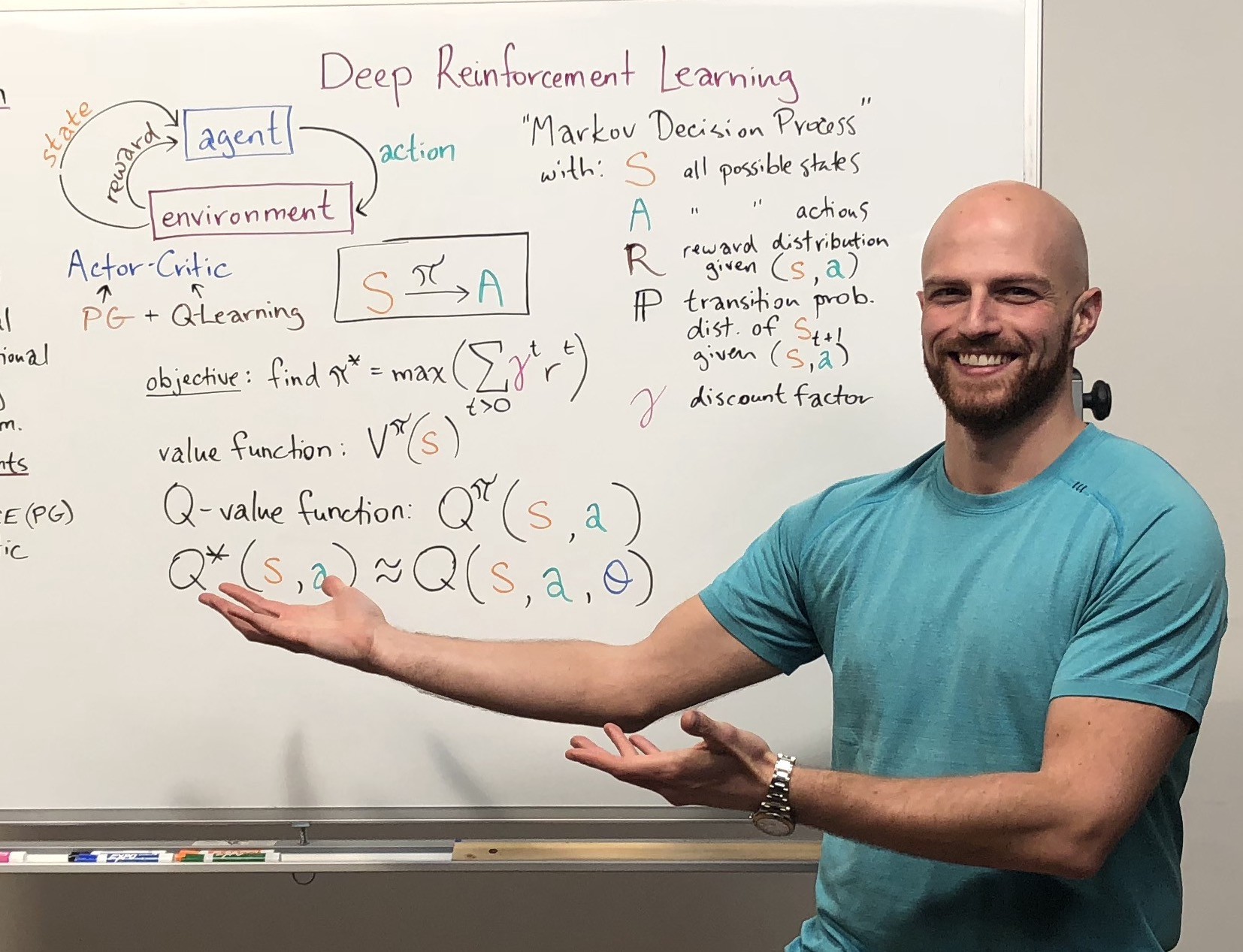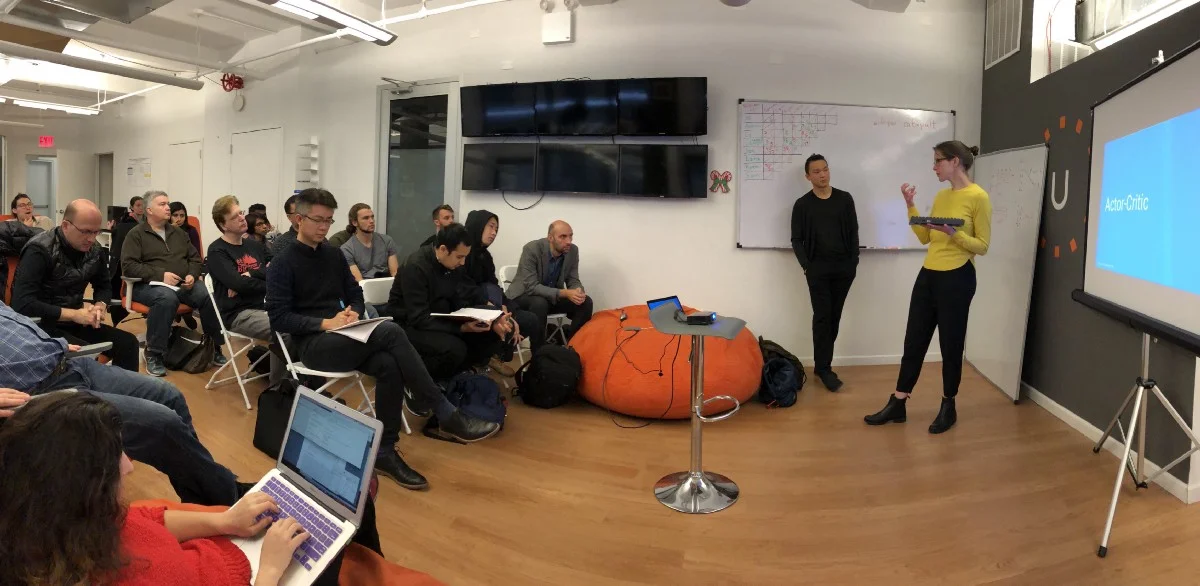Thrilled to be back in studio, this time filming "Deep Learning with TensorFlow, Keras, and PyTorch", which features the upcoming TensorFlow 2.0 library and will be released this autumn. All of the code is available as Jupyter notebooks in GitHub now.
"Deep Learning Illustrated" Released Digitally Today
My book, Deep Learning Illustrated, was released digitally today — visit informIT and use the code KROHN during checkout to get it at 35% off!
Physical copies will ship next month and can be pre-ordered via the same link.
Full Digital "Rough Cut" of Deep Learning Illustrated is Now Available →
The entirety of my first book, Deep Learning Illustrated, is now available online as a digital “rough cut”. Physical copies of the final version can be ordered and will ship soon. Click through for details, including the full Table of Contents.
Earth Day Sale: 70% Off Digital Content
For Earth Week, all of my digital content (22 hours of interactive Deep Learning tutorials) is available for 70% off. Use code EARTH until Friday :)
"Deep Learning Illustrated" Available for Pre-Order
I'm delighted to announce that my first book is now available for pre-order! Deep Learning Illustrated is a (surprisingly) fun introduction to Artificial Intelligence that I've written with the South African scientist Grant Beyleveld and Belgian artist Aglaé Bassens.
The book is being published by Addison-Wesley and will ship in the next few months. In the meantime, a "rough cut" of the first two-thirds of it is now live in Safari Books.
Provided here are illustrations that Aglaé created of the authorship team, in the style of her illustrations throughout the book, as well as the cover art!
Artificial Intelligence Panel
On November 27th, I sat on a panel discussing the present and future of artificial intelligence at Nasdaq Marketplace in New York. It was an honour to sit along side Peter Voss, originator of the now-predominant term Artificial General Intelligence, which refers to an AI that has a capacity roughly indistinguishable from that of a human.
PLOS Genetics Research Prize →
Feeling lucky to be recognised for a genetics research prize this month by the Public Library of Science (PLOS). Data I processed years ago was unearthed for an academic paper that received broad media attention, including on the BBC and in the Daily Mail.
Columbia University Lecture
On Friday, I provided a two-hour introductory lecture on Deep Learning and Deep Reinforcement Learning (specifically, Deep Q-Learning) to the Reinforcement Learning class at Columbia University for postgraduate electrical engineers. It was a pleasure to be able to speak to a room full of folks who were already abreast of the fundamentals of machine learning (e.g., cost functions, stochastic gradient descent) so that we could dive straight into the specifics of artificial neural networks. It was also fun to fill up all of the classroom’s overlapping, sliding chalkboards :)
Pintô Talk on AI
Last month, I had the honour of speaking to the Pintô cultural group about what Deep Learning AI is, how it’s impacting society today, and how it might in the future. I met countless fascinating people from various fields, all of whom asked terrifically clever questions.
Data scientists weigh in: 5 data science tools to consider →
Click through for a story from TechTarget on top data science tools. They appear to have erroneously misattributed a (perfectly reasonable) quote to me on R, but my quote about Jupyter Notebooks is the real deal.
untapt Hosts Its First Ever AI Think Tank Event In New York City →
On Tuesday afternoon, we (untapt) hosted a Think Tank on the use of algorithms for improving human-resources processes. Our audience was highly engaged and we were delighted that the average of their rankings of candidates for a given role aligned precisely with our algorithm's rankings.
In this press release issued yesterday, I commented:
Through the Think Tank's discussions and interactive exercises, we observed further evidence that both recruiters and candidates gain from the use of AI tools. The event demonstrated an inherent need for what we've built at untapt. As human-resources professionals increasingly appreciate that AI saves them time and capital while simultaneously improving the quality of the prospects they identify for open roles, we are witnessing a shift toward the technology's adoption. This fuels our passion to continue delivering solutions that make a difference.
Human Talent and Artificial Intelligence Collide in Advanced New Offering from untapt →
This press release from July 19th formally launched our (untapt's) AI product, an algorithm for matching candidates with roles at scale. It offers expert-human-recruiter accuracy but is millions of times faster.
In the piece, I was quoted as saying:
The complexity and nuance of problems in the talent space make them fascinating ones to tackle with models that incorporate automation. Through the application of the latest statistical computing approaches from academia, we've harnessed the might of our large, high-dimensional data to streamline human-resource processes with commensurate subtlety. I'm delighted that these models are now available to our clients, minimizing drudgery and freeing up their time to focus on creative, interpersonal work.
Gareth Moody, my colleague and dear friend, opined that my choice of language in the quote was not un-awkward and that my verbosity was excessive.
Want Less-Biased Decisions? Use Algorithms. →
Forthcoming research out of Columbia University indicates that, compared with human screeners, an algorithm that decides which job applicants should get interviews "exhibited significantly less bias against candidates that were underrepresented at the firm".
My 30-Hour Deep Learning Course: 30% Discount for Female Students →
Beginning July 21st for five weekends, I’ll be teaching my 30-hour course on deep learning in-classroom at the NYC Data Science Academy. This will be my third time teaching the course, which I developed based on the content of my forthcoming book.
While the first two iterations of the course — offered in late 2017 and Spring 2018 — were popular, only one out of every ten participants was a woman. In hopes of reaching gender parity, the Academy has whole-heartedly supported my suggestion that we offer a 30% discount to female students — their largest discount ever. To receive the sizeable reduction of nearly $1000, registrants are encouraged to use the code DLFORWOMEN upon checkout.
Deep Reinforcement Learning Experiments Run Simultaneously Across OpenAI and Unity Environments →
SLM Lab is an open-source tool created by Laura Graesser and Wah Loon Keng for training Deep Reinforcement Learning agents across multiple complex environments. At the most recent session of our Deep Learning Study Group, Keng and Laura provided us with an interactive demo of it.
Deep Reinforcement Learning and Generative Adversarial Networks: Tutorials with Jupyter Notebooks →
Two families of Deep Learning architectures have yielded the lion’s share of recent years' “artificial intelligence” advances. Click through for this blog post, which introduces both families and summarises my newly-released interactive video tutorials on them.
Filming “Deep Reinforcement Learning and Generative Adversarial Network LiveLessons” →
Following on the back of my Deep Learning with TensorFlow and Deep Learning for Natural Language Processing tutorials, I recently recorded a new set of videos covering Deep Reinforcement Learning and Generative Adversarial Networks. These two subfields of deep learning are arguably the most rapidly-evolving so it was a thrill both to learn about these topics and to put the videos together.
“OpenAI Lab” for Deep Reinforcement Learning Experimentation →
With SantaCon’s blizzard-y carnage erupting around untapt’s Manhattan office, the members of the Deep Learning Study Group trekked through snow and crowds of eggnog-saturated merry-makers to continue our Deep Reinforcement Learning journey.
We were fortunate have this session be led by Laura Graesser and Wah Loon Keng. Laura and Keng are the human brains behind the OpenAI Lab Python library for automating experiments that involve Deep RL agents exploring virtual environments. Click through to read more.
"Deep Learning with TensorFlow" is a 2017 Community Favourite
My Deep Learning with TensorFlow tutorial made my publisher's list of their highest-rated content in 2017. To celebrate, the code "FAVE" gets you 60% off the videos until January 8th.
Deep Reinforcement Learning: Our Prescribed Study Path →
At the fifteenth session of our Deep Learning Study Group, we began coverage of Reinforcement Learning. This post introduces Deep Reinforcement Learning and discusses the resources we found most useful for starting from scratch in this space.

